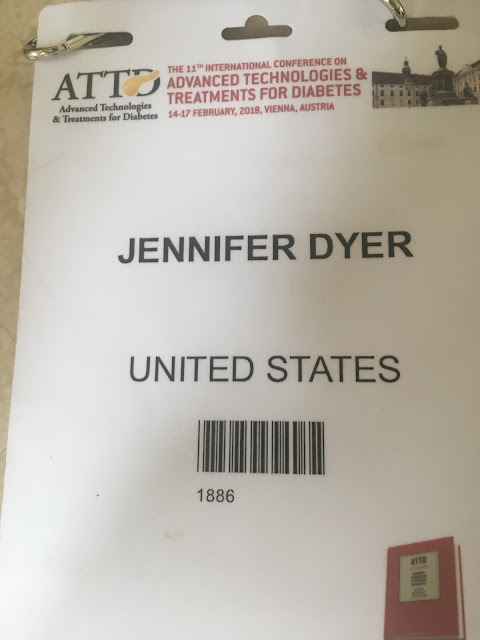I just returned from the ATTD Conference held in Vienna and my main reaction was WOW! The future for people with diabetes is so very bright. So bright that I was inspired to start blogging again and to work harder on my own entrepreneur projects.
A central theme to the conference was that we, the healthcare industry, are not doing a good job for people with diabetes….glucoses after meals and overall blood glucoses are just too high. And, the numbers of new people with type 1 diabetes are increasing across the world. We must do better.
Compared to last year which was almost exclusively artificial pancreas data discussion, there was much more focus on the benefits of cgm in clinical practice: monitoring time in range, using cgm with or without pumps (the DIaMonD study was discussed multiple times), and assessing post prandial highs that improve with faster insulins (fiasp, afrezza). I would have loved to have also seen Steve Ponder’s sugar surfing included in the discussions but I guess Europe hasn’t met the surfers yet? Integrating cgm data with the 'internet of things' such as fitness trackers, refrigerators, mattresses with AI could perhaps one day anticipate trends and assist artificial pancreas algorithms.
I was interested to learn more about experiences with Abbott freestyle libre (flash) sensor, pros and cons, and to learn about a new implantable cgm sensor by Roche called Eversense which is currently approved for 6 months usage for each sensor in Europe. Cons though in my opinion are that the device has to be charged each day, is a bit bulky, and must be done as a procedure at the endocrinology office.
I was also impressed with #DIYPS #openaps being discussed ‘openly’ and enthusiastically with JDRF's statement of collaboration and Roche’s announcement of support for the movement. I would have liked to have seen more patients on the stage, however, discussing their stories and experiences (pros, cons) rather than just from a physician point of view. Nonetheless, nightscout supporters and patient advocates were everywhere in the audience making sure that the industry pushes harder to get products out faster in the name of the #wearenotwaiting movement.
Of course artificial pancreas was a big part of the conference. When the audience was polled using the conference's interactive app, artificial pancreas is thought to be the technology that will most improve patients' lives in the next 5 years. It was exciting to see that future Tandem and Omnipod artificial pancreas data suggests time in range was 88%! I am very much looking forward to the commercialization of their systems with the dexcom g6 sensor (hopefully next year?). The bionic pancreas with both glucagon and insulin, the iLet, is also working toward commercialization and would not require the meal announcements required by the other systems and algorithms. When BigFoot gets closer to commercialization I am guessing they too will be at a future ATTD conference for announcements. However, I was particularly impressed with the amount psychosocial data that is being evaluated with current artificial pancreas projects…they are looking to define more specifically how these systems help (or hurt) people with diabetes to achieve their life goals. In other words, it was said that good health is not a specific hgba1c or time in range but rather ‘having the health to live the life one wants to live.’
Digital innovations were also present at the conference. One of my favorites is the MedAngel temperature sensor. The device is placed in the bag that you carry your insulin in. It alerts you through a mobile app if the temperature is not safe for the insulin thereby keeping it most effective.
A French video game by Solar Games peaked my interest as it is basically a sims experience in which a practice develops its own content for diabetes education that they would like their patients to learn. However, I feel that the concept of diabetes virtual coaching currently provided by the wonderful app MySugr as well as by Canary Health are more likely to make the largest impact. Of course we need outcomes data to really know. Nevertheless, support for self management with a chronic disease like diabetes as well as motivators for health behavior change is an area that needs more attention because...no technology or treatment works if a patient doesn't use it.
Access to technologies was also discussed with Dr. Irl Hirsh’s call to action being that physicians should actively immerse themselves in economics nomenclature and population health cost-savings analysis so as to better advocate for our patients with payers. Perhaps we should all have a Masters of Public Health, I know it has certainly helped me.
Disclosure: I am a paid speaker for Dexcom helping to educate primary care providers about the benefits of cgm for their patients.









